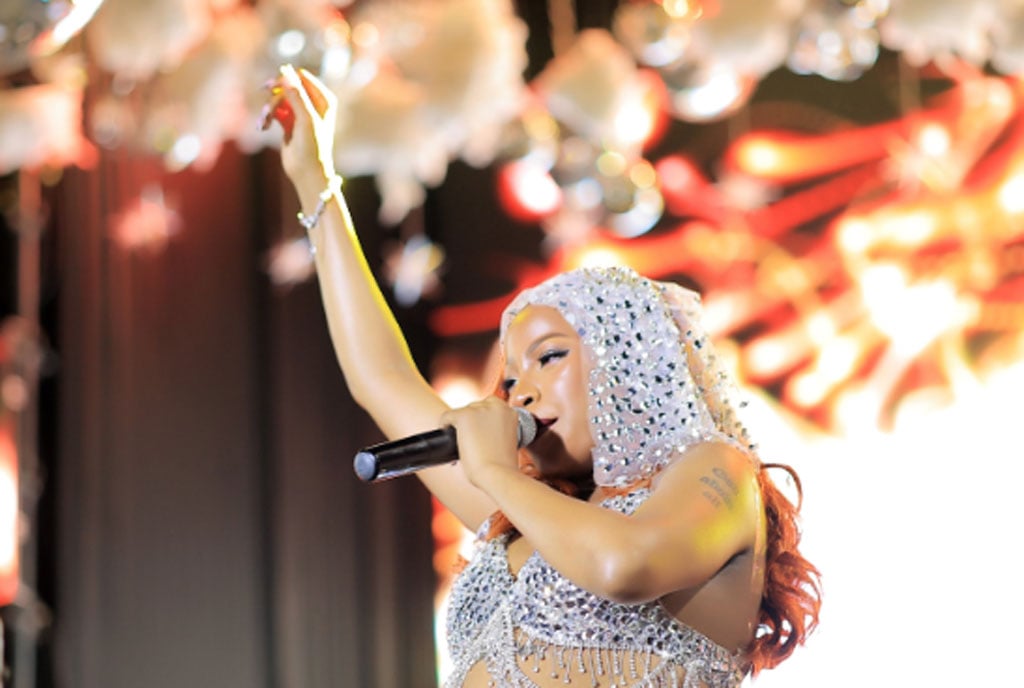
Sheeba Karungi on stage during the Neyanziza concert recently. PHOTO/COURTESY
At Sheebah Karungi’s Neyanziza concert, there were many vendors; many of these were mobile operators who accessed the venue as regular show patrons, thus didn’t incur some costs like other vendors, and yet, in the hit of the moment, they make money off the artist’s likeness and name.
At the beginning of the month, Sheebah Karungi, alias Queen Karma, and Swag Mama hosted her Neyanziza concert at the Lugogo Cricket Oval.
One thing that majorly stood out was the fact that this concert, just like her battle alongside Cindy, were both business moves. She knows she is a brand with adoring fans and haters in equal measures; if there was a rumour mill about her, what better way would she either put the questions to rest than in a concert where people actually pay for the reveal?
In that way, Sheebah ended up hosting one of the most expensive baby showers, and instead of receiving gifts, she got paid by adoring fans.
It is at concerts that many artists believe they will make money, though, with all the costs involved, such as production, security, advertisement, and venue, among others, they rarely break even.
A concert eco-system usually employs an array of people in departments such as stage, which includes the performers and stage managers, lighting and sound department, security, ushers, and the food department, among others.
It is believed at shows, food makes money, if there is a good turnout, the belief is that people will eat and drink. Then there are those selling merchandise.
These usually range from T-shirts, keyholders, calendars, bungles, notebooks, wristbands, jumpers, flash disks and, in some cases, unauthorised CDs and DVDs. All these products feature either a face, name, or music of an artist having the concert.
At Sheebah Karungi’s concert, there were many of such vendors; many of these were mobile operators who accessed the venue as regular show patrons, thus didn’t incur some costs like other vendors, and yet, in the hit of the moment, they make money off the artist’s likeness and name.
The Uganda National Musicians Federation (UNMF) was set up last year, putting together a number of musicians associations with the aim of seeking a stronger and effective copyright law. By the time the Eddy Kenzo-led federation was put together, Hon. Hillary Kiyaga, alias Dr. Hilderman, was also in the process of consultations for amendments to the current 2006 copyright law.
Phina Mugerwa, one of the leaders at the Uganda Musicians Association (UMA), while speaking on NTV, noted that they have made some strides in amendments in the copyright law. However, she also said there is a lot that the industry, both the fanbase and artists, do not know about intellectual property. “Artistes elsewhere make a lot of money from merchandise, but in Uganda, diehard fans in the name of supporting their artistes unknowingly steal from them. Not a single artist benefits from the sales of merchandise at concerts,” she says.
Most of such sales are neither tracked nor documented, so even their pricing is dynamic, as they come. For instance, at Sheebah’s concert, some bracelets with her name or her alter egos, Swag Mama and Queen Karma were sold at Shs5,000, while others sold the same kind of bracelets at Shs8,000 or even more.
According to Charles Batambuze, the vice chairman, National Cultural Forum, many artists have ignored their rights and are losing money to smart fanbase.
Similar situation
Winnie Asege, a successful commercial farmer based in Soroti, sued Opportunity Bank , when her image was used on billboards and advertising flyers, brochures and calendars without her consent. Batambuze says fans hawking T-shirts with an image of the artist are violating the artist and directly stealing from them.
However, for those selling wristbands, flags and memorabilia bearing words such as Leone Island, Queen Karma, Swag Mama or Gagamel, he says it is only a violation, if an artist in question registered their name, stage name or company name as a trademark.
“You need to have registered the trademark to be protected,” he says. A concert like Sheebah's Neyanziza is never just a show, it is an online event followed by even those at home. Some follow through tweets and social media, while others watch on YouTube and various TV stations.
Mugerwa says that these spaces have become part of the artists' exploiters in the long run. “When promoters are looking for sponsors, they approach the media and most times, the media will burgain for exclusivity in form of coverage and interviews. On the concert day, however, they set up and stream the entire show across their platforms. They get viewers and subscriptions, but the artist gets nothing and some people may still opt to stay home and just watch the whole thing on TV,” she says.
Clear contracts
Batambuze says performers need clear defined contracts, which give them rights to streaming. However, he says there is also a need to tighten the permissions, especially those who show up as patrons. With Tiktok and YouTube becoming some of the go-to-platforms for both entertainment and information, content creators pay for VIP and VVIP tickets that place them next to the stage. They spend the bigger part of the evening creating content for those that stayed at home. Sadly, they also do this at the expense of the performers.
“I wasn’t around for Madrat and Chiko’s Nseko Buseko 10- year anniversary, but I watched all of it as it went down. It was available on various platforms. For all my shows, I announce to my audience and media that my production crew is recording the show. If anyone records and later streams it, I can take legal action,” says Patrick ‘Salvado’ Idrigi.
Batambuze says that most of the time promoters approach media houses and somehow leave out vital information while reporting back to artistes. For instance, many artists at times have no idea of the nature of agreement they are entering with the TV besides them airing the concert adverts.
“One of the reasons promoters and artists are losing money is because they don’t look at streaming. Through streaming, various online channels and TV stations create a revenue leakage,” he says.



